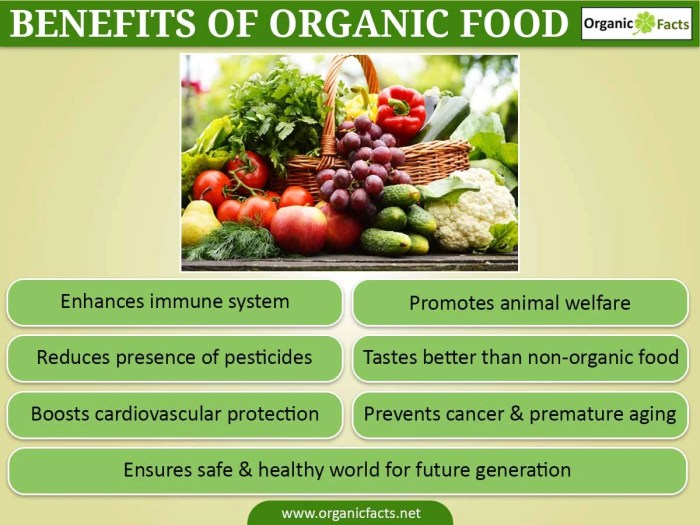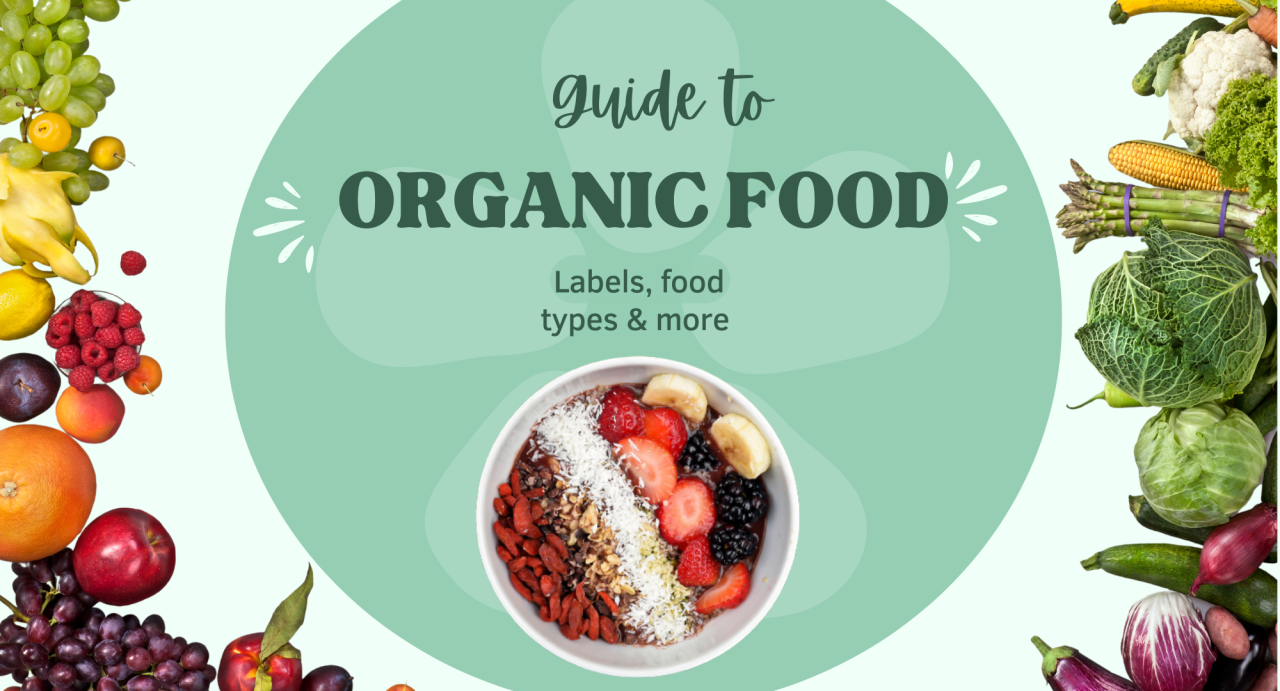Organic food benefits are not just a trend, they are a lifestyle choice that can have a positive impact on your well-being. From nutrient-packed produce to sustainable farming methods, the advantages of choosing organic are vast and impactful. Let’s dive into the world of organic food benefits and discover why they are worth considering.
Introduction to Organic Food

Organic food is food grown or produced without the use of synthetic pesticides, fertilizers, GMOs, or antibiotics. It is cultivated using natural methods that promote soil and water conservation, reduce pollution, and enhance biodiversity.
Difference Between Organic and Conventional Food
Organic food is free from harmful chemicals and additives commonly found in conventional food. Conventional food, on the other hand, is grown using synthetic chemicals and pesticides that can have negative impacts on human health and the environment.
- Organic food is non-GMO, while conventional food often contains genetically modified organisms.
- Organic farming practices promote soil health and biodiversity, whereas conventional farming can degrade soil quality and harm ecosystems.
- Organic food is produced without antibiotics, growth hormones, or synthetic additives, making it a healthier choice for consumers.
Importance of Choosing Organic Products
Choosing organic products can have numerous benefits for both individuals and the environment. Organic food is often richer in nutrients, antioxidants, and essential vitamins and minerals compared to conventional food. Additionally, by supporting organic farming practices, consumers can help reduce the exposure to harmful chemicals in our food supply and protect the planet for future generations.
- Organic food supports local farmers and promotes sustainable agricultural practices.
- Organic farming reduces the risk of water contamination and soil erosion, contributing to a healthier environment.
- By choosing organic products, consumers can prioritize their health and well-being by avoiding potentially harmful chemicals and additives.
Nutritional Benefits: Organic Food Benefits
Organic food offers numerous nutritional advantages compared to non-organic options. Not only does organic produce contain higher levels of certain nutrients, but it also lacks harmful chemicals and pesticides commonly found in conventionally grown food.
Nutrient Content Comparison
When comparing organic and non-organic food, studies have shown that organic produce tends to have higher levels of certain vitamins, minerals, and antioxidants. For example, organic fruits and vegetables have been found to have higher levels of vitamin C, iron, magnesium, and phosphorus compared to their non-organic counterparts. These nutrients are essential for overall health and well-being.
Key Nutrients in Organic Produce
- Antioxidants: Organic fruits and vegetables are rich in antioxidants, which help protect the body from oxidative stress and inflammation.
- Vitamin C: Organic citrus fruits, berries, and leafy greens are excellent sources of vitamin C, an essential nutrient for a healthy immune system.
- Iron: Organic leafy greens, lentils, and beans are great sources of iron, crucial for oxygen transport in the body.
- Magnesium: Organic nuts, seeds, and whole grains are high in magnesium, important for nerve function and muscle health.
- Phosphorus: Organic dairy products and fish contain phosphorus, vital for bone health and energy production.
Health Benefits
Organic food can contribute to overall health by providing higher levels of nutrients, antioxidants, and beneficial compounds compared to non-organic food. The absence of synthetic pesticides, hormones, and antibiotics in organic farming also reduces the risk of exposure to harmful chemicals that can negatively impact health.
Potential Health Risks of Non-Organic Food
- Exposure to pesticide residues: Non-organic food may contain pesticide residues that have been linked to various health issues such as cancer, hormone disruption, and neurological disorders.
- Antibiotic resistance: The use of antibiotics in non-organic animal farming can contribute to the development of antibiotic-resistant bacteria, posing a serious threat to human health.
- Lower nutrient content: Non-organic food may have lower levels of essential nutrients due to the use of synthetic fertilizers and intensive farming practices.
Research Supporting Health Benefits of Organic Food
According to a study published in the British Journal of Nutrition, organic crops have higher levels of beneficial antioxidants and lower levels of toxic heavy metals compared to conventionally grown crops.
Research from Stanford University found that organic produce contains higher levels of certain nutrients, such as vitamin C, and lower levels of pesticide residues than non-organic produce.
Environmental Benefits
Organic farming practices are known for being environmentally friendly as they prioritize sustainability and natural processes. These practices avoid the use of synthetic pesticides, fertilizers, and genetically modified organisms.
Comparison of Environmental Impact
- Organic agriculture helps reduce pollution of soil, water, and air by avoiding synthetic chemicals that can harm ecosystems.
- Conventional agriculture relies heavily on synthetic pesticides and fertilizers, which can lead to water contamination, soil degradation, and harm to beneficial insects.
- Organic farming promotes biodiversity by preserving natural habitats and supporting a variety of plant and animal species.
Importance of Sustainable Farming Methods
Adopting sustainable farming methods, such as organic practices, is crucial for ensuring the long-term health of the planet. By prioritizing soil health, biodiversity, and natural resources, sustainable farming helps mitigate climate change and protect ecosystems for future generations.
Taste and Quality

Organic food not only offers numerous health benefits but also stands out in terms of taste and quality. When it comes to comparing organic and non-organic options, many people find that organic food tends to have a richer, more flavorful taste. This is because organic farming practices prioritize soil health, which can enhance the nutrient content of the produce and ultimately lead to better taste.
Quality Standards
Organic products are held to high quality standards throughout the production process. Organic farmers must adhere to strict regulations that prohibit the use of synthetic pesticides, herbicides, and fertilizers. This ensures that the food is grown in a way that is environmentally sustainable and free from harmful chemicals. By following these standards, organic products are able to maintain their quality and freshness.
Enhancing Flavor, Organic food benefits
Organic farming practices focus on building healthy soil through techniques like crop rotation, composting, and natural pest control. This not only benefits the environment but also contributes to the overall flavor and quality of the food. By nurturing the soil and using natural methods to protect crops, organic farmers are able to produce fruits, vegetables, and grains that are full of flavor and nutrients.
Cost Considerations
Organic food is often perceived as more expensive than conventional food, which can deter some consumers from making the switch. However, when considering the long-term benefits of organic food for both personal health and the environment, the cost difference may be justified. Let’s take a closer look at the factors influencing the pricing of organic products and how you can make organic food more affordable.
Cost Differences
Organic food is typically priced higher than conventional food due to the labor-intensive practices involved in organic farming, the certification process, and the limited use of synthetic chemicals. This can result in higher production costs for organic farmers, which are then passed on to consumers through higher prices at the grocery store.
Factors Affecting Pricing
- Organic Certification: The cost of obtaining and maintaining organic certification can add to the overall price of organic products.
- Supply and Demand: Limited supply of organic products compared to conventional products can drive up prices.
- Transportation and Distribution: Organic products may need to be transported longer distances or through specialized channels, adding to their cost.
Tips for Affordability
- Buy in Bulk: Purchasing organic items in bulk can help reduce the overall cost per unit.
- Shop Seasonally: Opt for organic produce that is in season, as it tends to be more affordable.
- Grow Your Own: Consider growing your own organic herbs, fruits, or vegetables to save money and ensure quality.
Certification and Labeling
Organic products go through a rigorous certification process to ensure they meet specific standards set by regulatory bodies. This process involves inspections, documentation, and testing to guarantee that the products are grown or produced in an organic manner.
Different Organic Labels
- USDA Organic: This label signifies that the product has been certified organic by the United States Department of Agriculture. It ensures that the product is made with at least 95% organic ingredients.
- Non-GMO Project Verified: This label indicates that the product does not contain genetically modified organisms (GMOs). It assures consumers that the product is free from genetic engineering.
- Fair Trade Certified: This label ensures that the product was produced in an ethical manner, providing fair wages and working conditions for farmers and workers.
Importance of Certified Organic Products
Looking for certified organic products is essential as it guarantees that the food you are consuming is free from harmful chemicals, pesticides, and synthetic additives. It also supports sustainable agricultural practices and promotes environmental conservation.